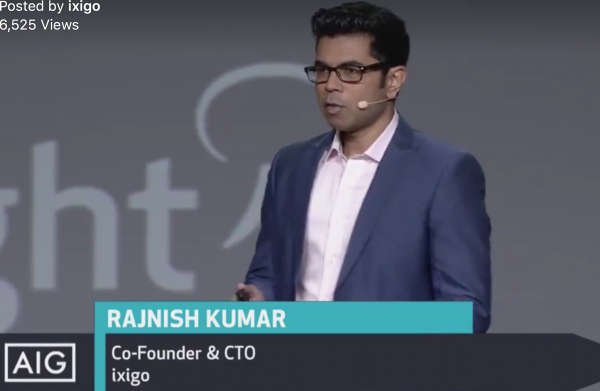Over the past decade, mobile has revolutionized the travel industry and is reshaping how every travel organization interacts with its travellers. However, there are bigger changes looming on the horizon, with the emergence of voice search, artificial intelligence and conversational messaging. Combined together, these technologies are reshaping the future of travel, and most importantly, travel agents.
Travel-meta search engine ixigo recently unveiled TARA (Travel Assistant and Recommendation Agent), a 100% AI-driven travel assistant for flights. She takes care of all your flight-related needs across discovery, research, planning, booking and trip management. TARA is exactly like the travel agent of the past, except that she responds instantly and is available 24×7. She has all flight-related information and deals at her fingertips, she is unbiased and knows your preferences, and she doesn’t sleep at night. Her aim is to make sure you simply focus on enjoying your trip. TARA also won the runner’s up award at the Phocuswright Conference this year.
Omniscient digital assistants, from Google Trips to Lola, are set to change the dynamics of travel. New apps are increasingly relying on artificial intelligence to go beyond just helping travellers plan trips, to learning their preferences and even suggesting personalized itineraries. This is great news for consumers, who are going to benefit immensely in terms of convenience, but will it mean bad news for travel agents who are likely to lose traffic to these new assistants?
Digital travel assistants provide users a single point of contact through which they can book trips, thus vastly narrowing down options, and hassles of connecting with different companies for their travel getaway. For instance, Expedia has partnered with Amazon to offer its services through the Alexa digital assistant, who allows users to book flights or call a cab through Amazon Echo. These tools allow travellers to make requests using more intuitive language and questions; a much more seamless experience than calling or getting on the website.
Moreover, digital assistants cover the entire travel experience. So instead of hotels or airlines sending individual notifications, these apps bring everything together and break the silo, thus bringing them closer to the one-point contact travel experience that passengers expect. Digitization has given them this choice in a big way.
For travel agents, these interfaces represent both a great opportunity and a threat. These conversational apps provide a new tool to resolve simple customer problems, so they can focus on more complicated requests. While they are perfect for today’s mobile environment, they will also require more back-end work to educate customers and provide the right responses.
Whether agents like it or not, consumer behavior will continue to change. The only question that remains is how should they adapt. The executives who manage to get it right will stand to profit the most. Using these AI softwares and platforms, and optimizing for their virtual assistants could be one solution. However, if they can provide a great user experience, they stand a strong chance of competing regardless of how it’s delivered.
Whatever the interaction model that travel agents choose, typing in a mobile web-browser is definitely not going to make the cut in a mobile-first future.





















